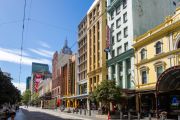
Office occupancy rises as CBD workers trickle back
City workers are trickling back to their offices in increasing numbers across the country, although Sydney CBD offices have only just hit 40 per cent occupancy,
Canberra had the strongest flow back to work over October, with occupancy now at 63 per cent, after the Australian Public Service Commission directed staff back to the office where it was safe to do so. Adelaide and Perth office occupancy is above 70 per cent.
In Melbourne, where a strict lockdown has only just eased and the government has a directive that workers must work at home if they can, office occupancy is at 7 per cent.
The rates are compiled by the Property Council of Australia based on responses from 102 office landlords, who collectively own or manage the majority of central business district office buildings.
“The shift is on and more CBD workers are coming back to their offices, which is an important step in Australia’s economic recovery,” chief executive Ken Morrison said.
“This is encouraging news for the Australian economy given the critical role of CBD-based businesses in supporting jobs and economic activity, including for all of those businesses which depend on CBD workforces for their viability.”
The survey also gauges what factors influence decisions to return to office workplaces. By October, concerns about public transport and workplace safety outweighed public health restrictions.
Even so, Kevin George, executive general manager for Dexus, the nation’s largest office landlord, said public health orders represent a significant impediment to a more widespread return.
In NSW, employers must allow their employees to work from home if it is practical to do so.
“It’s very hard to have a productivity argument with your staff when there is a heath order out there,” Mr George said. “But what bosses are telling me is that organisational productivity is suffering.”
“Management teams want their people back in the office. By changing the health orders I think you’ll find the leadership in organisations will require people to come back to the office.”
Beyond the immediate impediment posed by the pandemic to working in CBD offices, considerable uncertainty remains on the long-term impact to the office market of the widespread embrace of working from home.
JPMorgan analysts have modelled a 10 per cent reduction in occupied office space across all CBD markets as a result of a longer-term shift in working from home, driving rents and, ultimately, tower values lower.
However, Mr George said that while organisations would likely allow for some more flexibility, it was simply too soon to tell what view they would take on productivity and their workplace requirements longer term.
“I don’t think you can flick the switch on this. Organisations might experiment for a period but I don’t think they will make definitive long-term decisions until they have better data. It’s way too early.”











